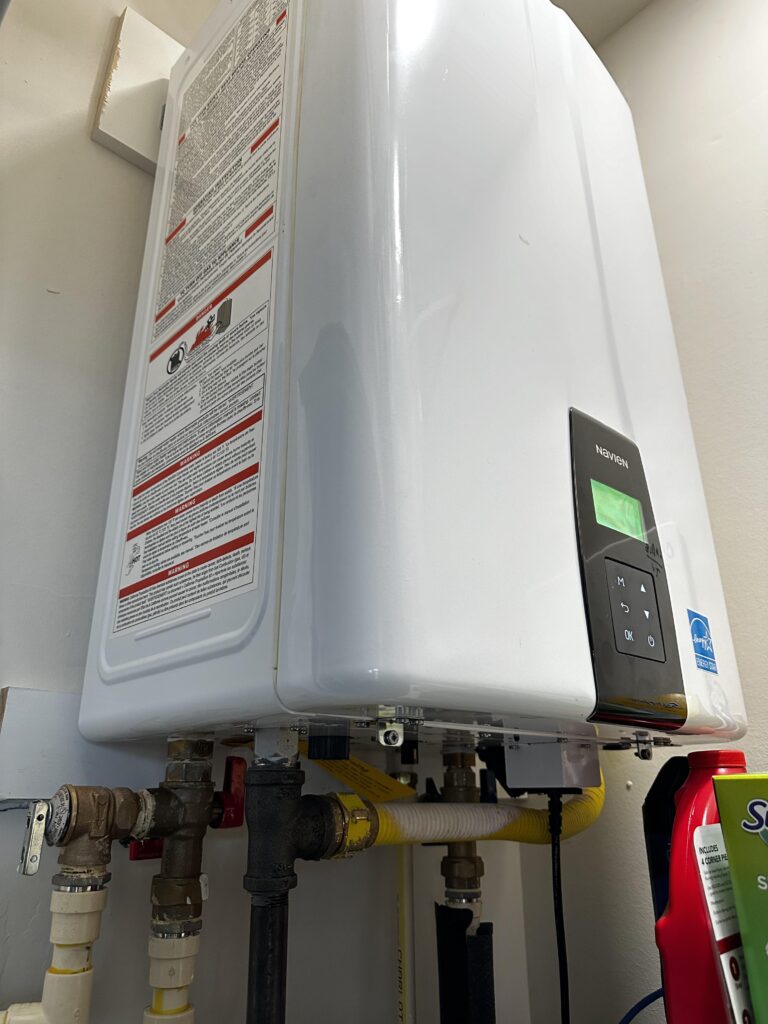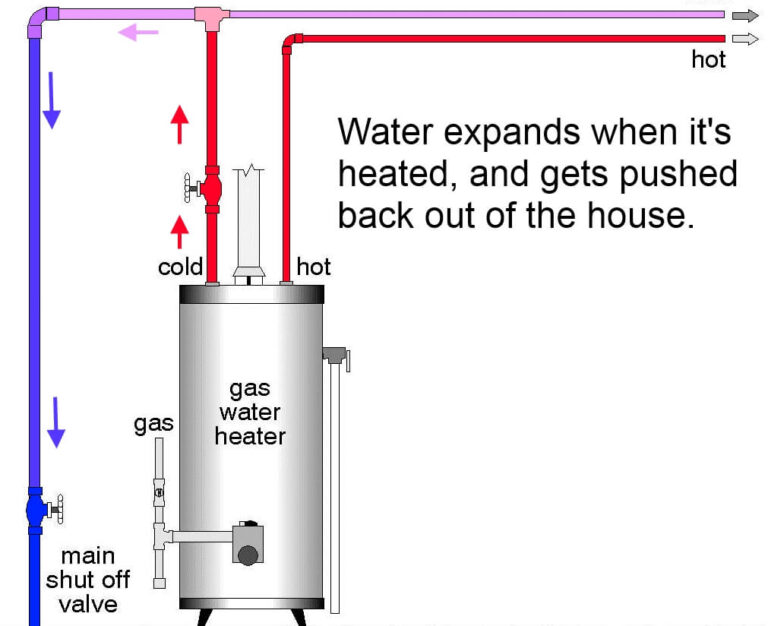Is your Rheem water heater causing trouble with a pesky leaking drain valve? You’re not alone.
A leaking drain valve can be more than just an inconvenience; it can lead to water damage, increased utility bills, and even a complete system breakdown if not addressed promptly. When you notice that telltale drip, it’s natural to feel a bit overwhelmed.
But don’t worry, you’re about to discover simple, effective solutions to stop that leak in its tracks. This guide will provide you with straightforward steps and insider tips to fix the problem quickly. Ready to save time, money, and your peace of mind? Let’s dive right in and tackle that leak together!

Credit: the5starplumbing.com
Identifying The Leak
Spotting a leak in your Rheem water heater’s drain valve can prevent bigger issues. Check for moisture around the valve. A consistent drip may indicate a need for repair or replacement.
Discovering a leak in your Rheem water heater can be daunting. But identifying the source of the leak is the first step to fixing it. Understanding where the leak comes from can save you time, money, and a lot of frustration.Common Leak Signs
Spotting a leak early can prevent bigger issues down the road. Look for water pooling around the base of your water heater. Listen for any unusual dripping sounds, especially at night when your home is quieter. Check for rust or corrosion on the outside of the water heater. This can often signal that water is escaping from somewhere within. Have you noticed a sudden spike in your water bill? A leak might be the culprit.Potential Leak Causes
Several factors could cause your Rheem water heater’s drain valve to leak. One common cause is a loose valve. Over time, the valve can become unthreaded, allowing water to seep out. Another potential cause is sediment buildup. This can occur if you haven’t drained your water heater regularly. The sediment can prevent the valve from closing properly, leading to leaks. Sometimes, the drain valve itself may be defective or damaged. Have you considered the age of your water heater? Older units are more prone to wear and tear, making them susceptible to leaks. Identifying the leak is just the beginning. With these insights, you are now equipped to take the next steps towards resolving the issue. What will you do to fix your water heater today?
Credit: www.reddit.com
Necessary Tools And Materials
Dealing with a Rheem water heater drain valve leak can be troublesome. Knowing the necessary tools and materials is crucial for a successful fix. Proper preparation ensures efficiency and safety during the repair process.
Tools For The Job
Ensure you have a wrench to loosen the drain valve. A screwdriver may be needed for any screws involved. Get an adjustable plier for tight spaces. A bucket is essential to collect water during the repair.
Materials Needed
Purchase a new drain valve if yours is faulty. Teflon tape helps seal connections properly. An old towel or rag will be handy for cleaning spills. Consider having a sealant for any leaks around the valve.
Safety Gear
Wear gloves to protect your hands from sharp edges. Safety goggles shield your eyes from splashes. Ensure proper ventilation to avoid inhaling any harmful fumes. A mask may be needed if working in a poorly ventilated area.
Preparation Steps
Before starting, turn off the power supply to your water heater. Drain the tank completely to prevent any water damage. Inspect the surrounding area to ensure no hazards are present. Gather all tools and materials within reach.
Safety Precautions
Facing a leaking Rheem water heater drain valve? Ensure safety first by turning off the power supply. Then, stop the water flow by closing the main water valve. Always use protective gear to avoid burns or injuries during inspection and repairs.
Dealing with a leaking Rheem water heater drain valve can be a daunting task, but ensuring safety is paramount. Before diving into the repair process, it’s crucial to take certain precautions to prevent accidents and further damage. Safety precautions not only safeguard you but also prolong the life of your water heater.Shutting Off Power
Before you do anything, make sure to shut off the power to your water heater. This is non-negotiable. If it’s electric, locate the circuit breaker and switch it off. Don’t assume that everything will be fine without shutting off power. Electric shocks are a real danger. If your heater runs on gas, turn off the gas supply valve. Taking these steps might seem obvious, but ignoring them can lead to serious injuries. Have you ever had to deal with an electrical mishap because you skipped this step? It’s never worth the risk.Draining The Heater
Draining your water heater is essential to check the valve. Attach a hose to the drain valve and run it to a nearby floor drain or outside. Open the valve to let the water out. This prevents any messy spills and gives you a clear view of the valve’s condition. Why not make this a routine maintenance task? Regular drainage can prevent sediment buildup, which often leads to leaks. Take your time with this process. Rushing might lead to accidental spills or incomplete draining. The clearer the valve area, the easier it is to spot any issues.
Credit: www.youtube.com
Temporary Fixes
Dealing with a leaking Rheem water heater drain valve can be frustrating, especially when you’re not ready to splurge on a permanent fix. Sometimes, all you need is a temporary solution to tide you over. Knowing a few handy tricks can save you from unnecessary stress and keep your water heater running smoothly until you can address the issue more permanently. Let’s dive into some simple, effective temporary fixes that you can apply right away.
Tightening The Valve
Have you noticed a small puddle forming under your water heater? Before you panic, it might be as simple as tightening the valve. Sometimes, the valve becomes loose over time due to regular usage or vibrations. Grab a wrench and give it a gentle twist to see if that stops the leak.
Be cautious not to over-tighten, as this can damage the valve further. A slight turn may be all it takes. If you’ve ever tightened a leaky faucet at home, you’ll find this task similar. It’s a quick fix that can save you a lot of hassle.
Applying Sealant
When tightening the valve doesn’t do the trick, consider applying a sealant. This method is particularly useful if the leak is coming from a small crack or gap. You can find plumbing sealant at your local hardware store—it’s affordable and easy to use.
Before applying, clean the area around the leak to ensure the sealant adheres properly. Think of it like using super glue; the cleaner the surface, the better the bond. A thin layer of sealant can work wonders in stopping that leak temporarily.
Have you ever patched a tire on your bike? It’s kind of like that, offering a temporary solution until you can replace the tire entirely. The sealant forms a temporary barrier that keeps the water contained.
These fixes are not meant to last forever, but they can certainly buy you some time. Have you tried any of these methods before? What worked for you? Share your experiences and insights in the comments below. Remember, a proactive approach can keep minor issues from turning into major headaches!
Replacing The Drain Valve
Facing a leaking Rheem water heater drain valve can be frustrating. Replacing the faulty valve promptly prevents further water damage. This simple fix ensures your water heater functions efficiently, maintaining a reliable hot water supply in your home.
Replacing the drain valve on your Rheem water heater can feel daunting, but it’s a manageable task that can save you from bigger headaches down the road. A leaking drain valve is not just a minor inconvenience; it can lead to water damage and reduced efficiency in your water heater. Tackling this problem head-on will not only protect your home but also extend the life of your appliance.Choosing A Replacement Valve
Selecting the right replacement valve is crucial. You want a valve that matches the specifications of your existing setup. Check the size and type—plastic or brass are common options. Brass valves are more durable, while plastic ones are budget-friendly. Consider the pros and cons based on your needs and budget. Visit a local hardware store or browse online for the best deals. Look for reviews to ensure the product’s reliability. Have you ever bought something that didn’t fit or work as expected? Avoid this hassle by double-checking your choice.Installing The New Valve
Begin by turning off the power supply to your water heater. This is a critical safety step. Next, drain the water heater completely to prevent spills and accidents. Once drained, remove the old valve using a wrench. Be gentle to avoid damaging surrounding parts. Install the new valve by threading it into place and tightening securely. A snug fit is essential to prevent future leaks. Finally, refill the tank and restore power to the heater. Check for leaks by observing the valve area closely. Wouldn’t you feel relieved knowing there’s no water dripping down again? If there’s still a leak, reassess the installation steps or consult a professional. Taking these steps can seem simple yet daunting, but remember, every task gets easier with practice and patience. Are you ready to tackle this DIY project and ensure your water heater operates smoothly?Preventing Future Leaks
A Rheem water heater drain valve leak can be prevented by regular inspections and timely maintenance. Ensure the valve is tightly sealed and replace worn-out parts promptly. Proper care reduces the risk of future leaks, keeping your water heater functioning efficiently.
Preventing future leaks in your Rheem water heater drain valve is crucial. Leaks not only waste water but can lead to costly repairs. By taking proactive steps, you ensure the longevity and efficiency of your water heater. Regular maintenance and upgrading materials are key strategies to prevent leaks. These methods help maintain a reliable and efficient water heater.Regular Maintenance Tips
Regular maintenance is essential for preventing leaks. Check the drain valve periodically for signs of wear or damage. Tighten loose connections to prevent leaks. Clean the valve area to remove any debris. Sediment buildup can cause leaks, so flushing the tank is important. Inspect the valve for rust or corrosion. Replace the valve if it shows any signs of damage. Regular checks help catch problems early.Upgrading To Durable Materials
Upgrading to durable materials reduces leak risks. Consider replacing the plastic valve with a brass valve. Brass is stronger and lasts longer. It can handle higher pressure and temperature. Stainless steel is also a good option. These materials resist corrosion better than plastic. Investing in quality materials ensures fewer leaks over time. Durable materials provide peace of mind and reliability.When To Call A Professional
Having a Rheem water heater drain valve leak can be frustrating. You might feel the urge to fix it yourself, but sometimes calling a professional is the best move. Knowing when to make that call can save you time and prevent further damage. Let’s explore the signs that signal it’s time to reach out to an expert.
Persistent Leaks
If you’ve tried tightening the valve or replacing washers and the leak persists, it’s a clear indication that a professional is needed. A stubborn leak might suggest underlying issues that require specialized tools or knowledge. Don’t let a small drip turn into a flood; timely intervention can prevent costly repairs.
Unusual Noises
Unusual noises from your water heater can be alarming. If you hear banging or popping sounds, it might be a sign of sediment build-up or pressure issues. A professional can assess the situation accurately and perform necessary maintenance. Ignoring these sounds can lead to more severe problems.
Complex Installations
If your water heater system is complex or involves additional components, it’s wise to call in a professional. They have the expertise to handle intricate setups and ensure everything functions smoothly. Attempting to fix a complicated system without the right skills can lead to mistakes and damage.
Warranty Concerns
Is your water heater still under warranty? Attempting DIY repairs might void it. Professional repairs are typically covered under warranty terms, ensuring you don’t lose out on potential benefits. Protect your investment by understanding the warranty conditions and acting accordingly.
Safety Risks
Handling water heaters involves dealing with electricity and water—an often dangerous combination. If you’re unsure about safety precautions, it’s best to call a professional. They follow safety protocols that minimize risks, ensuring you and your family stay safe.
Have you ever attempted a DIY repair only to find the problem worsening? It’s a common tale many can relate to. Why risk turning a manageable situation into a larger issue when experts are just a call away? Consider the long-term benefits of professional help when facing drain valve leaks.
Frequently Asked Questions
Why Is My Water Heater Drain Valve Leaking?
A leaking water heater drain valve often indicates a worn-out or faulty valve. Sediment buildup or improper closure can also cause leaks. Regular maintenance and periodic valve checks help prevent such issues. Consider replacing the valve if tightening doesn’t stop the leak.
Why Is There Water Dripping Out Of The Relief Valve Discharge Line On A Water Heater?
Water drips from the relief valve discharge line due to excess pressure or temperature in the water heater. This safety feature prevents damage by releasing water. Regularly check for leaks or faulty valves to ensure proper functioning and avoid potential issues with your water heater system.
How To Stop A Drain Off Valve Leaking?
Tighten the valve packing nut using a wrench to stop leaks. Replace damaged washers or seals for a secure fit. Ensure the valve is clean and free from debris. Regular maintenance can prevent future leaks, ensuring efficient operation. Consult a professional if the leak persists.
What Is The Most Common Problem With Rheem Water Heaters?
The most common problem with Rheem water heaters is a faulty thermostat. This issue can cause inconsistent water temperatures. Regular maintenance and timely repairs can help prevent this problem and ensure efficient performance.
Conclusion
Fixing a leaking Rheem water heater valve is crucial. Ignoring leaks can cause bigger problems. Regular maintenance helps prevent issues. Check for drips and corrosion. Replace faulty valves promptly. A small effort today saves money and stress later. Leaks also waste water, affecting your bills.
Inspect your water heater often. Catch problems early for peace of mind. An efficient water heater ensures consistent hot water supply. Simple checks and timely fixes make a difference. Keep your home safe and your heater working well. A little care goes a long way in maintaining performance.



